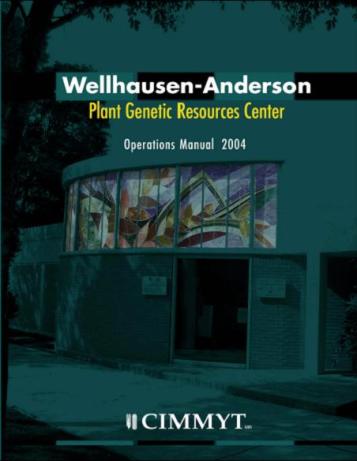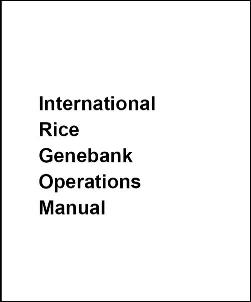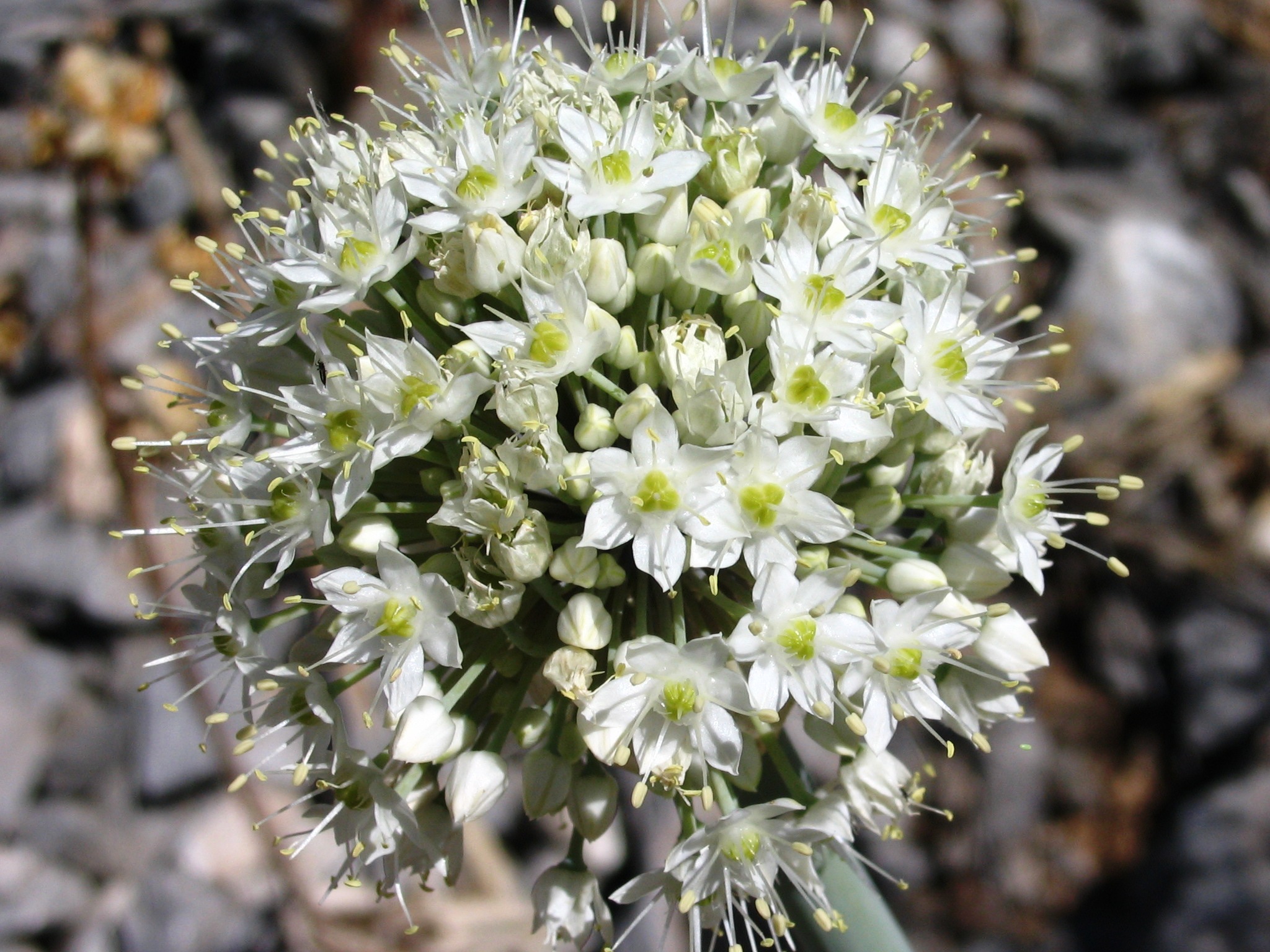CGKB News and events Learning resources
Genebank procedures
Click on the left to view videos on the different genebank procedures
Importance of crop wild relatives
|
|
Crop wild relatives are the unrecognized and often unnoticed backbone of plant breeding programmes. Toby Hodgkin, Principal Scientist at Bioversity, explains the significance of crop wild relatives and the struggle to conserve them.
CIMMYT (Maize and Wheat) genebank operations manual
 |
Download this manual in pdf format here (0.5MB)
This manual might be interesting or useful for readers to see how operations at the genebank of the International Maize and Wheat Improvement Center (CIMMYT) are conducted.
In 2004, CIMMYT restructured its research programs into six new global and ecoregional programs. One of these, the Genetic Resources Program, is now home to CIMMYT’s maize and wheat germplasm banks. This new organizational structure indicates the high importance and visibility that CIMMYT places on our role as custodians of maize, wheat, and related species genetic resources.
One of the first priorities of the program was to update the operations manual for the germplasm banks. The result of this effort is this publication, the Wellhausen-Anderson Genetic Resources Center Operations Manual. The policies and procedures outlined in the manual represent those currently being used in the introduction, evaluation, maintenance, regeneration, and distribution of genetic resources at CIMMYT. By following these procedures, CIMMYT ensures that the genetic resources entrusted to it in its germplasm banks are available to the world and that they maintain their genetic integrity while under CIMMYT's custodianship.
Contents
Preface
I. Background
A. Description of Maize and Related Species
A.1. Importance of maize for global food security and research
A.2. Origin of the maize
A.3. Centers of diversity
B. Description of Wheat and Related Species
B.1. Importance of wheat for global food security and research
B.2. Origin of the wheat
B.3. Centers of diversity
C. History of CIMMYT’s Germplasm Bank
C.1. Maize
C.2. Wheat
C.3. Wellhausen-Anderson Plant Genetic Resources Center
D. International Laws/Agreements that Affect Genetic Resources
II. Genebank Operations
A. Physical Infrastructure
B. New Introductions/Accessions to the Maize and Wheat Collections
B.1. Maize: guiding principles for new introductions
B.2. Wheat: guiding principles for new introductions
B.3. Introduction of new materials
C. Seed Viability and Germination Tests
D. Regeneration of Introductions/Accessions
D.1. Maize regeneration
D.2. Teosinte regeneration
D.3. Tripsacum regeneration
D.4. Wheat regeneration
E. Evaluation of Maize and Wheat/Accessions
F. Shipments
F.1. Maize
F.2. Wheat
G. Back-up Collections
G.1. Maize
G.2. Wheat
H. Data Management
H.1. Maize
H.2. Wheat
I. References
IRRI (Rice) genebank operations manual
 |
Download this manual in pdf format here (0.3MB)
This manual describes how and why the various operations and procedures of rice genetic conservation at the International Rice Research Institute (IRRI) are carried out. Since its original compilation in 1995, several modifications have been introduced in the work activities. These are incorporated in this revised edition (2000) of the Manual.
IRRI hopes readers of this Manual will find it informative and useful in their own conservation programs.
Contents
CHAPTER 1 - CONSERVATION OF RICE GENETIC RESOURCES AT IRRI
The conservation of rice genetic resources at IRRI
The need for genetic conservation
The genebank
Germplasm acquisition and conservation
Germplasm exchange
Germplasm characterization and evaluation
Data management
CHAPTER 2 - SEED MULTIPLICATION OF ORYZA SATIVA AND O. GLABERRIMA GERMPLASM
Seed multiplication of Oryza sativa and O. Glaberrima germplasm
Selection of planting materials
Seeding and seedbed activities
Field activities
CHAPTER 3 - SEED CONSERVATION
Introduction to seed conservation
Harvest verification
Seed cleaning and selection
Viability testing
Seed health evaluation
Final drying
Packing
Duplicate storage
Maintenance
CHAPTER 4 - GERMPLASM NURSERY SCREENHOUSES
The germplasm nursery screenhouses
Cultivated species
Wild rices
CHAPTER 5 - GERMPLASM CHARACTERIZATION AND EVALUATION
Introduction to germplasm characterization and evaluation
Selection of Materials for Characterization
Plant Establishment
Morpho-Agronomic Characterization
CHAPTER 6 - GERMPLASM EXCHANGE
Receipt of germplasm
Processing newly received germplasm
Protocol for seed distribution
IRRI’s policy on germplasm exchange
IRRI’s Policy on Intellectual Property Rights
Protocol for requesting information
CHAPTER 7 - DOCUMENTATION AND EXCHANGE OF GERMPLASM INFORMATION
Documentation and exchange of germplasm information
Background
System accessibility
System objectives
System menu structure
Features and capabilities
IRCGIS User's Manual
Data integrity
Data security
Data exchange
System documentation
CHAPTER 8 - MOLECULAR MARKER LABORATORY
Molecular marker laboratory
Protocol for DNA Sample Preparation
RAPD Protocol
Microsatellite Protocol
AFLP Protocol
Abbreviations/Acronyms
CHAPTER 9 - CONSERVATION SUPPORT
Conservation support
In vitro germination
Cytology
Orcein
APPENDICES
More Articles...
- Cassava in vitro processing and gene banking
- Yam in vitro gene banking
- Seed processing for IITA genebank
- Establishment and management of field genebank
- Manuals and handbooks
- Methods and statistics
- Practical manuals for Genebanks
- Wild species conservation
- Seed and seed genebanks
- Molecular genetics and DNA banks
Subcategories
-
Training modules
- Article Count:
- 13
-
Videos and slideshows
- Article Count:
- 25
-
Manuals and handbooks
- Article Count:
- 15
-
Powerpoint presentations
- Article Count:
- 3
-
Publications
- Article Count:
- 13
-
main
- Article Count:
- 7
-
Other languages
- Article Count:
- 6





